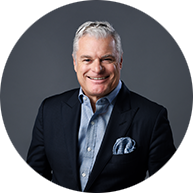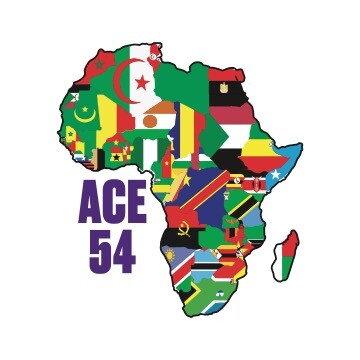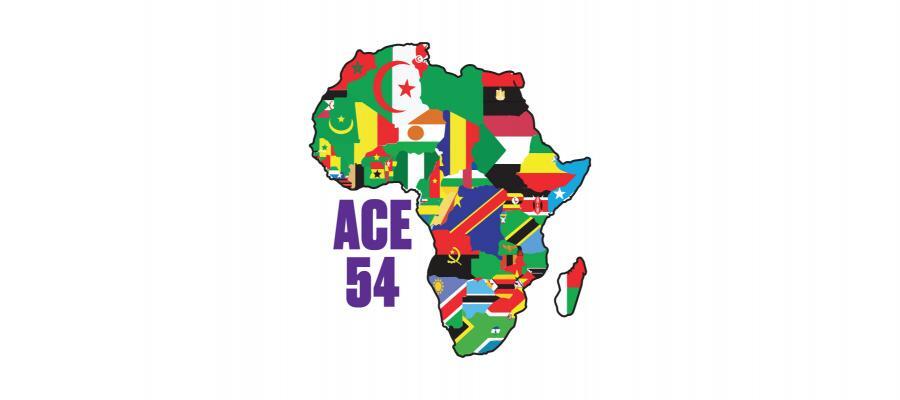Interview with
Mr. Philippe Somers
CEO

ACE 54: how did the name come about and what does it mean?
“ACE”…We wanted a word that described exceptional talent or expertise. The definition states: “ranked highest” and “a person who excels at a particular activity”. Other words which describe the word “ACE” are master / expert / genius / winner / professional.
“54” because of 54 countries in Africa.
African trade is your focus. Please elaborate for our readers about your experience on the African continent and your background.
From the early to mid-nineties, I was based in Gabon (Central Africa) and combined my roles in Libreville and Port Gentil with extensive assignments in Pointe Noire, Republic of Congo, and also part of the Central African region.
It was my real first assignment in the project business. I filled roles from Branch Manager, Head of the Ship’s Agency & Husbandry Services, Freight Forwarding Manager and Deputy Managing Director. These assignments taught me to lay the foundation of international trade relations, a combination of the African business culture and the African day-to-day life. That was my first important business—and life—lesson.
In all these roles, one has to wear different hats, and nowhere else more than in Africa, project clients expect the manager to be in the front line from commercial up to the administrative tasks. Most importantly, I quickly learned that the execution of the job is what matters most.
In addition, I was confronted with the reality that success or failure may have tremendous high financial consequences in our (industrial projects) activity. Oil & Gas was very indicative. When delivery of equipment did not reach the offshore rig on time or pipes and machinery were delayed arriving at the port, the financial consequences ran into the millions of dollars per day. On the other hand, timely and early deliveries may cause the operators to award our client a (financial) bonus.
So, preparing complex and bureaucratic customs clearance processes, obtaining all necessary permits and authorizations from port and customs authorities correctly and in a timely fashion, are critical to a flawless delivery. Even though it is 25 years later, this has not changed and is still equally the most important and challenging part of flawlessly executing projects in Africa.
Before taking the global role at Geodis (2006-2018), Africa played another important role in my development. After a second spell in Houston, I was called in to rescue an operation in need in Nigeria (2005-2006). Nigeria is a country that is usually recognized for the highest population in Africa, abundant poverty, and with a high rate of corruption. At the same time, there is no country in Africa that has so many resources (mainly oil & gas) and runs as many billion-dollar projects simultaneously. During this time, we executed materials and pipes for one of the largest onshore pipeline projects from Nigeria to Ghana, running via Benin and Togo.
This experience helped me manage teams that handled the largest pipeline project in African history, the Chad-Cameroon pipeline for the world’s largest oil & gas company. The project involved 20 expatriates and 300 staff during peak times, with five different pipe yards and more than 100 onshore rig moves per year.
Between 2007 and 2019, we, together with our clients, were able to identify commercial opportunities that allowed us to open offices in Africa.
- In Algeria, we managed to win power projects in Oran, a rail/tram project for major French EPC, cement manufacture, oil & gas projects in upstream as well as downstream, i.e. In Salah and Amenas gas fields, oil E& P for Berkine, etc.
- In Libya, we accompanied our American oil & gas client and opened offices in Tripoli and Misrata to support their deep water drilling operations.
- Our experience in running a shore base for deep water drilling helped us win a similar contract in Morocco for a Spanish oil major.
- In Kenya, we opened an office to serve a Korean EPC during their power project.
- For another French mining EPC, we won a multi-million dollar project in Niger and to respond to the 2000 km trucking from ports in Togo and Benin to the site, we set up mechanic shops, ran staff houses, etc.
- We have many other examples where we mainly opened to accompany our international customers with their capital projects, respectively in Mauritania Senegal, Tanzania and Uganda. Apart from the above, I carried out P&L responsibilities in Cameroon, Chad, Congo, Gabon, South Africa, and Sudan.
The annual good results in Africa were a big contributor to the bottom line of our global statistics, and in fact, were the driver that allowed us to invest and grow in other parts of the world. Often our clients in Africa followed us to other continents based on our good performance in Africa.
While Africa has always been considered one of the most challenging places to execute projects, it is fair to say that the continent has the best risk-reward ratio in the world. Most of the time, African-based projects with lower volumes compared to bigger volume projects in Asia or the Middle East delivered better bottom lines.
The monopoly by most African ports, the challenging roads, the lack of lifting equipment, and the scarcity of special trucks/equipment required per the international QHSSE standards make operating costs in Africa very expensive. Usually, the African cost in-country is more expensive, perhaps almost double, to the origin charges.
Are you a freight forwarder? Are you a management company? How would you define your role in the market since it consists of a lot of players each protecting their own role?
We have consciously chosen to be a management company rather than a consultancy. ACE 54 Project Management (our official name) prides itself on being hands-on by supporting International Project Forwarders (IPF) with pricing and required technical information during the tenders that will decide on winning or losing high value business opportunities.
We act as the IPF, in-country pricing desk, taking the part of the African/local services from arrival of the vessel at the African port to the site. Everybody knows that this is the most challenging for the IPF. That is ACE 54’s immediate added value.
Apart from the above mentioned scope during tender stage, ACE 54 is actively part of some companies’ (destination agents or international project forwarders) business development, providing market intelligence of ALL projects in ALL industry projects segments (oil & gas, mining, renewables, power, infrastructure and nuclear) in ALL 54 countries. In other words, we create the pipeline in Africa for the IPF.
As you know, a pipeline is the best guideline for budgets and dictates for many project forwarding companies which strategic decisions to make. The concept is certainly unparalleled within the industry and therefore, requires a change of mindset. Yet, it has become a strategic decision for the IPF companies.
In our short existence, we have noticed that CEOs and company owners, who are always looking for profitable growth opportunities, have considered the ACE 54 concept as a unique opportunity to not only expand their geographical footprint (54 countries) but also gain market share from existing clients. With this approach, our customers are able to attract interest from companies they may not have had access to in the past. Company leaders understand that the concept does not require any investment, enabling them to avoid setting up offices in Africa or going through a complex, costly, and time-consuming agent vetting process. In this regard, our track record and experience are greatly recognized in the market.
The chicken and egg situation is always one in which it is difficult to have references before one has gotten the first projects off the ground. Do you have an already established track record, and can your knowhow and skill be verified in the market with your references?
The company was announced during the BB conference in IAH in October 2019 and registration was completed in early November. The project business has many steps before award of a project: several price indications during the client’s tender stage, RFI to RFQ, clarifications, and finally to project award (or loss). While we have already lost quotations, 80% of the delivered pricing and technical are pending final RFQ or award, have been lost by the shipper during his tender stage, or the project has been cancelled or delayed. Despite these difficulties, we remain focused on procuring the most competitive project solutions available in the market. The feedback from the market so far has been that the analytic processing of our quotations is offering different pricing comparisons subject to different technical solutions (customs clearance, tax regimes, etc.), entry ports, and routings.
We notice a steady increase of inquiries from the same customers, but also new project forwarders that have approached us. All of these are from Europe and Asia. Again, it takes time for the IPF to decide to focus on Africa. Once they have decided, they need to go after and receive the inquiries that – let’s not forget – they usually rejected in the past. It will take time before Aladdin’s cave opens with regards to ACE 54, but we have received more interest and inquiries than we anticipated in such a short period.
While we have built good momentum between February and March, with the COVID-19, inquiries (understandably) came to a standstill. While the pandemic is not over, we have been receiving new inquiries from new customers, which is showing that the business world is slowly but surely picking back up (although we know that the battle with the pandemic is not yet won).
There is no free lunch in Africa either. Generally, how is remuneration for your services agreed? Do you service only bigger companies or are you also able to support and offer smaller companies in the market your services?
Another important aspect of our concept is that we only get paid if the quotation has been won. If successful, ACE 54 will benefit from a success fee. If ACE 54 is actively part of the company’s business development on a first refusal basis, ACE 54 receives a monthly retainer to develop a certain segment, African country, or region in Africa. Due to the confidentiality involved, this usually requires ACE 54 to sign an NDA from both sides.
But more than anything, our target audience is International Project Forwarders (IPF), who are ready to expand their geographical footprint and are as committed to Africa as we are. We target companies where our market intelligence, country, and segment experience contribute to the company’s strategic growth.
Several people have given up on the African market because the feeling is that…well, Bollore or other big French outfits or global forwarders will do it or get it anyhow. But the truth is, I suppose, that NO ONE is a specialist in the whole of Africa, right?
Indeed, some companies with “just a company flag in the ground” and not necessarily dedicated to executing projects have often been awarded them by default. In reality, no company can claim to be the overall Africa project specialist. That is why ACE 54 is vetting/connecting and ensuring the IPF success in Africa. We develop relationships in the countries and become the conduit for success for our global clients shipping to Africa.
We have several clients in specific countries which have cultural business limitations, language barriers, communication deficiencies, but also African business knowledge. In the African sector, we are highly recommended for companies requiring assistance with large, multi-phased projects over several years, specifically, to help them manage the project from award to execution.
Our mission is to integrate the local culture with the International Project Forwarders and build the infrastructure proudly together with our partners.
What is the overall, main advantage of enlisting your services?
Our concept means the International Project Forwarder can avoid investing in setting up offices in Africa. The process is long, complex, and brings security and safety issues, not to mention demanding local contents, currency devaluation, and profit transfer limitations. If you need to go through agent vetting, it is cumbersome, time consuming, and expensive as travel costs of the network agents and QHSSE staff is required.
By using ACE 54, you don’t need to hire sales staff with African expertise, no training sessions required. We bring immediate expertise and experience that is vital to winning tenders to Africa…now. These commercial wins will generate quasi immediate bottom line results as avoiding investment in infrastructure or agent vetting will limit negative cash flow.
Tell us about how you got into shipping in the first place.
I was born in Antwerp, whose port has been Top 5 in the world for handling break bulk for many years. Who says “break bulk” says “project cargo”? My first job was working at one of the largest Antwerp stevedoring companies, where I was a cargo inspector. Then I moved on to Panalpina in Antwerp. Shortly after, I left to Gabon, Africa. The rest is history.
If people would like to contact you, what are their options?
You can reach us in many different ways…by mail project@ACE54.com, leaving us messages on the website www.ACE54.com, or leaving a message on my personal or company Linkedin.
We are used to working on the road and with mobile phones through BOTIM, Whatsapp messages.
If you need a face-to-face immediately and travel is not in the books (like now), we are reachable by MS Teams, Zoom or Skype for Business.


